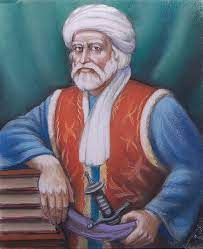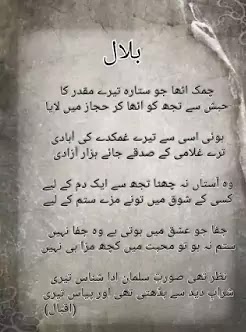Khushal Khan Khattak
Khushal Khan Khattak was born in 1613 in Akora Khattak during the Mughal reign. He is known worldwide for his Pashto poetry and Pashtoon nationalism.
The 16th century was the golden era of Pashto poetry, many great Pashto poets arose at that time including Maaz Ullah Mohmand, Rahman Baba, and Khushal Khan Khattak. Khushal khan Khattak was not only a poet but a Pashtoon chief and warrior. During his life span, he mostly served the Mughal empire, protecting them from the Pashtoon tribes in that area but when the Mughal superiors overthrew him from his tribal chiefdom, Khushal Khan turned against Mughals. Afterward, he encouraged revolts against Mughals the preached the union of Pashtoons. Khushal khan was the first to present a theory of united Pashtoons against all foreign invasions, for the creation of a Pashtoon national state.
The forefathers of Khushal Khan were Mughal officers for a long time, after the death of Khushal's father(Shehbaz Khan Khattak), he was appointed as the tribal chief of Mansabdar by the Mughal emperor Shah Jehan in 1641. His principality was appreciated by the Mughal emperor but after the death of Shah Jehan, his relations deteriorated with Aurangzeb. In 1658, Aurangzeb took Khushal as a prisnor at the Gwalior Fort. Later when he was released in 1668, he dissociated himself from the Mughal Empire, and afterward, he contacted other Pashtoon tribes and with their support, he started a well-organized resistance against the Mughals.
Upon the release of Khushal Khan, the Mughal authorities offered him high services of the empire, in order to gain back his service and loyalty but Khushal turned down all those offers and said "I have never committed an act that's against the empire's interest, I even killed my own Pashtoon brothers to promote the empire interest but in spite of my services and loyalty I am still not a Mughal". But the Mughals could not bear his resistance and therefore he was offered either to be a friend or an enemy. Shortly Khushal Khan joined Darya Khan Afridi and Aimal Khan Mohmand in their fights against Mughals. The Pashtoon tribesmen were not only considered as a defensive wall to the North West but also a fighting force against Sikhs and Marathas. In 1672, some Mughal soldiers under Governor Amir Khan allegedly tried to sexually harass a woman of the Safi tribe, the tribesmen retaliated and killed the soldiers. When Governor heard about the incident, he demanded on the emperor's behalf from the Safi tribe elders that the killers should be handover but they refused to do so. This triggered a battle between Pashtoon tribesmen under Khushal Khan Khattak and Mughal forces under Governor Amir Khan. Afghan sources claim that Amir Khan suffered a humiliating defeat in this battle.
During the last days of Khushal Khan, his own son Behram Khan joined hands with Mughals and turned against him for the sack of the elderly position of the tribe. Behram Khan promised the Mughals that he'll either arrest or kill his father for Mughals. In retaliation, Khushal Khan visited the Pashtoon tribal chiefs, particularly the Yousafzais to unite against Mughals but fail to do so. When he failed to unite the Pashtun tribes, he retired as a warrior and focused on his writings.
Khushal Khan's poetry consists of about 45000 poems. It is estimated that he wrote about 200 books. His most famous books include Baaznama, Farukhnama, Fazalnama, and Tabibnama. Apart from Pashto, Khushal Khan also wrote poems in Persian under his pen name Ruhi. In 1862 H. G. Raverty for the first time translated Khushal Khan's writings into English. In 1890 English translation of Khushal Khan's writings was published in London.
After hundreds of years of his death, Khushal Khan still lives in the hearts of Pashtoons. He is the national poet of Afghanistan, in addition to a university in Karak, Pakistan, and train service, Khushal Khan Khattak express has been named after him. Allama Iqbal has also written a poem on Khushal Khan, named 'Khushal Khan ki waseehat'






0 Comments